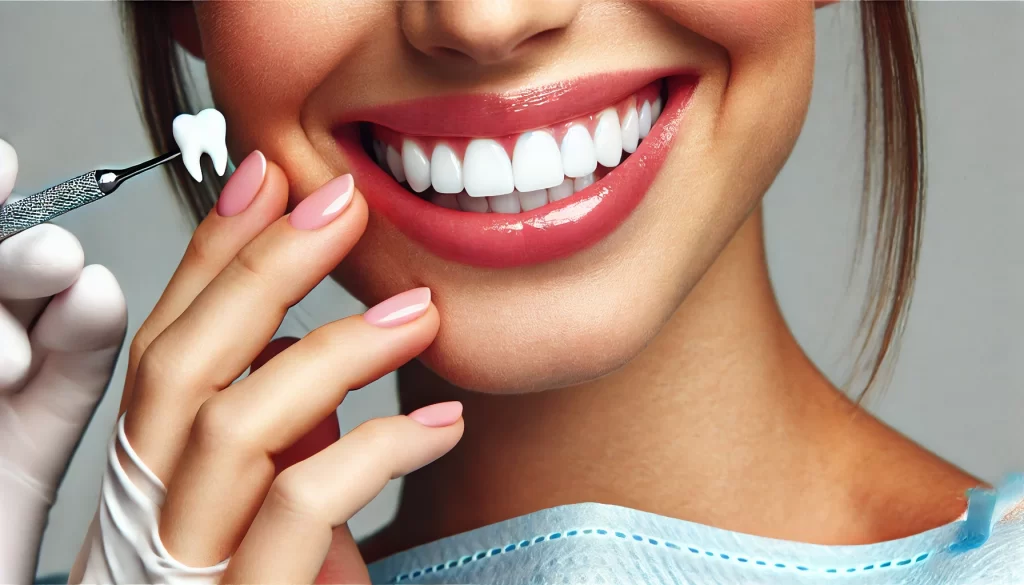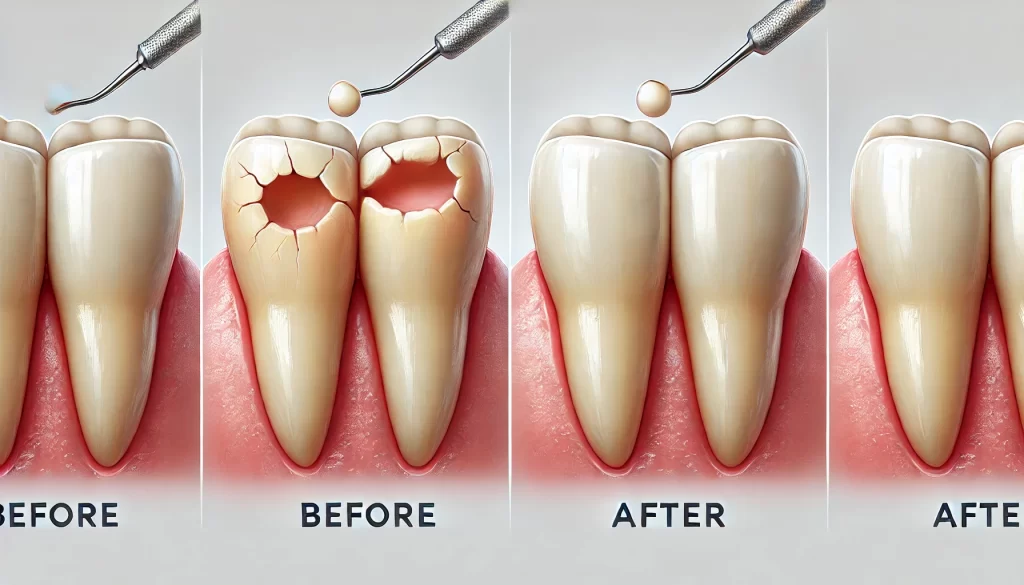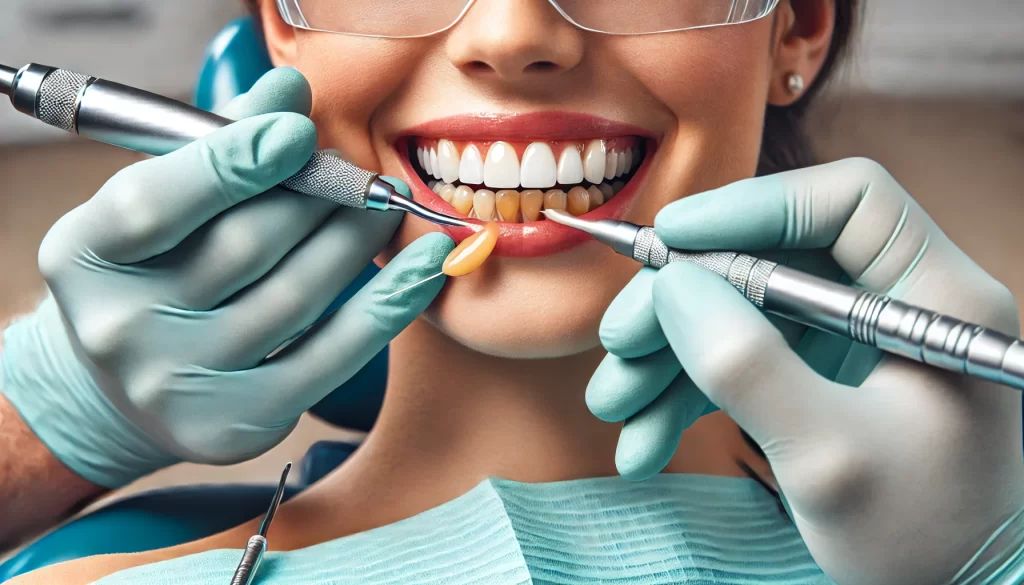Table of Contents
How Long Does Dental Bonding Last? Dental bonding is a popular cosmetic procedure that enhances your smile by fixing minor dental issues like chips, gaps, or discoloration. But how long does dental bonding last? Whether you’ve just had the procedure or are considering it, you might wonder how durable this solution is. In this article, we’ll uncover the shocking truth about how long does dental bonding lasts, what factors affect its lifespan, and how you can maintain it to keep your smile looking perfect for years.
How Long Does Dental Bonding Last? What Is Dental Bonding?

Before diving into how long does dental bonding last, let’s first understand what dental bonding is. How long does dental bonding last is a common concern for anyone considering this cosmetic procedure, which involves a dentist applying a tooth-colored resin material to fix imperfections. It’s often used to repair minor chips, close small gaps, or improve the appearance of discolored teeth.
The process is relatively quick, and unlike veneers or crowns, dental bonding doesn’t require extensive preparation or the removal of tooth enamel. However, the real question remains: how long does dental bonding last, and is it worth the investment?
How Long Does Dental Bonding Last on Average?
One of the most common questions when considering this treatment is, “How long does dental bonding last?” On average, dental bonding can last anywhere from 3 to 10 years. The lifespan can vary depending on factors such as the location of the bonded tooth, your oral hygiene habits, and your lifestyle.
Teeth that undergo a lot of pressure, like molars, may have a shorter lifespan for dental bonding than front teeth. However, with proper care and attention, you can significantly extend the life of your dental bonding.
Elements That Impact Dental Bonding’s Lifespan
Location of the Bonded Tooth
The placement of the bonded tooth plays a significant role in how long dental bonding lasts. Bonding on teeth used for chewing, such as the molars, may wear out faster due to the pressure applied during eating. On the other hand, dental bonding on front teeth may last longer since these teeth are less subjected to constant chewing force.
Oral Hygiene Routine
Good oral hygiene is crucial to the longevity of dental bonding. Brushing and flossing regularly and attending dental check-ups can help prolong the lifespan of your dental bonding. Neglecting oral hygiene can cause bonding material to wear down faster and may lead to cavities forming around the bonded area.
Lifestyle Choices
Certain lifestyle habits can significantly shorten the lifespan of dental bonding. Smoking, chewing on complex objects like ice or pens, and consuming staining foods or drinks such as coffee, red wine, or soda can all affect the durability and appearance of your bonded teeth. Making smart lifestyle choices is essential if you want your bonding to last as long as possible.
The Skill of the Dentist
The quality and skill of your dentist also play a significant role in how long dental bonding lasts. A highly skilled dentist can apply the bonding material to maximize its durability. That’s why choosing a dentist with experience in cosmetic dentistry is essential to ensure you get the best possible outcome.
Strategies for Extending the Life of Your Dental Bonding

Now that we know how long dental bonding lasts, let’s explore some simple tips to help extend its lifespan. You can enjoy the benefits of your bonded teeth for many years with a little care.
Maintain a Good Oral Hygiene Routine
The first step to ensuring your dental bonding lasts as long as possible is to maintain excellent oral hygiene. Floss daily to remove any food particles that could cause plaque buildup around the bonded teeth.
Avoid Staining Foods and Drinks
As dental bonding material can stain over time, it is a good idea to avoid or limit your intake of foods and beverages known to cause discoloration. These include coffee, tea, red wine, and dark berries. If you do consume these, make sure to rinse your mouth with water afterward to minimize staining.
Wear a Mouthguard for Protection
Consider wearing a mouthguard if you grind your teeth at night or play sports. Teeth grinding (bruxism) can put excessive pressure on the bonded teeth, causing the bonding to chip or crack. A mouthguard can protect your teeth and extend the life of your dental bonding.
Regular Dental Check-ups
Visit your dentist regularly for check-ups and cleanings. Your dentist will monitor the condition of your bonded teeth and catch any potential issues early, such as bonding material wearing down. Regular visits will ensure your bonding stays in excellent condition for as long as possible.
Pros and Cons of Dental Bonding
While we’ve covered how long dental bonding lasts, it’s also essential to weigh the benefits and drawbacks of this cosmetic treatment.
Pros of Dental Bonding
- Quick and Affordable: Dental bonding is faster and more affordable than other cosmetic treatments like veneers.
- Minimally Invasive: The procedure typically doesn’t require removing tooth enamel, making it a less invasive option.
- Natural Appearance: The resin used in bonding matches the color of your natural teeth, giving you a seamless smile.
Cons of Dental Bonding
- Not as Durable as Veneers: While dental bonding is adequate, it’s not as durable or long-lasting as other treatments like veneers or crowns.
- Prone to Staining: Unlike natural teeth, bonding material can stain over time, especially if you consume many staining foods and drinks.
Also Read: How Long Does Aspirin Stay in Your System? Shocking Truth Revealed!
When to Consider Replacing or Touching Up Dental Bonding
Even though dental bonding can last several years, it may eventually need to be touched up or replaced. If you notice any of the following signs, it might be time to visit your dentist:
- Chips or Cracks: If the bonded tooth chips or cracks, it’s essential to have it repaired as soon as possible to prevent further damage.
- Staining: If your bonded teeth have become discolored and no longer match the rest of your smile, consider touching up the bonding.
- Wear and Tear: Dental bonding may wear down over time, especially if it’s on a tooth that experiences a lot of pressure. If the bonding looks worn, your dentist can touch it up or replace it.
So, how long does dental bonding last? While the average lifespan is 3 to 10 years, it ultimately depends on factors like the location of the bonding, your oral hygiene habits, and lifestyle choices. With proper care, you can enjoy the benefits of dental bonding for many years to come. If you want to keep your bonded teeth looking their best, maintain good oral hygiene, avoid staining foods, and visit your dentist regularly. Now that you know the shocking truth, you can decide whether dental bonding suits you!



